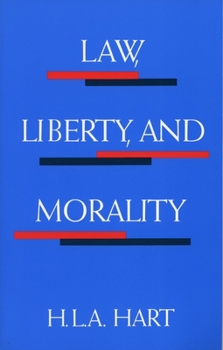Law, Liberty, and Morality
Select Format
Select Condition 
Book Overview
This incisive book deals with the use of the criminal law to enforce morality, in particular sexual morality, a subject of particular interest and importance since the publication of the Wolfenden Report in 1957. Professor Hart first considers John Stuart Mill's famous declaration: "The only purpose for which power can be rightfully exercised over any member of a civilized community is to prevent harm to others." During the last hundred...
Format:Paperback
Language:English
ISBN:0804701547
ISBN13:9780804701549
Release Date:June 1963
Publisher:Stanford University Press
Length:96 Pages
Weight:0.25 lbs.
Dimensions:0.3" x 5.3" x 8.4"
Customer Reviews
3 ratings
Law, Liberty and Morality
Published by Thriftbooks.com User , 18 years ago
H. L. A. Hart, who was a contemporary of Lord Patrick Devlin, criticized him for his very rigid position on the government's role in enacting and enforcing morality laws against its citizens. Herbert Lionel Adolphus Hart lived from 1907 to 1992. Hart was one of the most influential philosophers of law in the twentieth century, and he taught at Oxford University. His 1963, book "Law, Liberty and Morality" is a refutation of Devlin's theories of the government's role in criminalizing private moral misconduct. They both debated on opposite sides of the British government's 1957, Wolfenden Report which looked into the subject of decriminalizing homosexuality and prostitution. Devlin was the only member of the committee of fourteen who voted against decriminalizing the two acts in question. Hart, though not a member of the committee nevertheless, was very influential in the governments relaxing its laws against homosexuality in 1967. Though Hart is supportive of the idea that society did have some common moral values worth supporting, he is troubled by Devlin's far-reaching statement that, "immorality jeopardizes or weakens society." In fact, Hart accused Devlin of holding the position that any change in a society's morality would bring about its demise. Devlin balked at Hart's accusation, and retorted that he only believed the idea that any change in a society's morality could bring about its demise. Hart is definitely in agreement with John Stuart Mill's concept of liberty when he writes, "...society can not only survive individual divergences in other fields from its prevalent morality, but profit from them." The other aspect of the disagreement between Devlin and Hart was in the arena of how much of an impact religious values should dictate in a society's moral values and laws. In his book, Devlin asked the question, how citizens were supposed to derive moral values if they did not rely on religious authority. He answered, that lawyers had generally ignored the question and had generally accepted the notion that Christian morality remained just as acceptable to society as a whole today as it had been when the church was the sole arbiter of morality in the past. Devlin also takes philosophers to task for thinking that a human being's conscience can fill the void that religious morality would leave if it were no longer in force. "It cannot, unless some way be found of making up a collective conscience." Devlin seriously doubted that humankind would ever be able to find a collective conscience. However, he did not want to stifle people's freedom in asking questions about what the state's role should be regarding moral values. In fact Devlin writes that, "The unending search for truth goes on and so does the struggle towards the perfect society." Instead of outlawing all immoral acts, Hart advocated for a more nuanced approach in answer to Devlin's question on when society should outlaw immorality. Hart separated immoral acts int
Another Hart clasic
Published by Thriftbooks.com User , 24 years ago
H.L.A. Hart is perhaps the 20th century's greatest legal philosopher, and this small book is a powerful expression of his views on the relationship between law and morality. Simply put, Hart takes the side of John Stuart Mill on the issue of legal regulation of vice. The arguments are straightforward, and Hart gives opposing viewpoints a fair hearing before offering his rebutalls.
A great source for any anti-censorship, etc. person
Published by Thriftbooks.com User , 24 years ago
I first read the 1963 edition in a course called "Philosophy of Law" at Stanford in '66, and it's one of the few texts from then that I know I have in the attic, and have read at least five times since. It's just a little book, but invaluable. He organizes the arguments around the issue of the legalization of prostitution, but the specific arguments are made to carry the water of all the similar issues. It is dense, but beautifully written and beautifully argued, you just have to read it a bit slowly to let each paragraph soak in.





